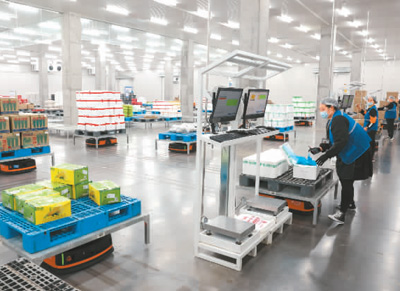Thriving digital retail biz in China provides customers with better shopping experience
To boost new types of consumption, regions throughout China have accelerated the digital retail upgrade and the construction of a digital supply chain system for physical stores since the beginning of the year with the emergence of new business forms and models of the digital retail trade.
A large number of stores in the country are shifting to instant retail services and embracing the huge online market by leveraging technologies, including big data and artificial intelligence (AI), as the digital economy develops.

Photo taken on Feb. 10 shows a night view of southwest China's Chongqing Municipality. (Xinhua/Huang Wei)
"Instant retail, in essence, means the digitalization of physical stores, which provide goods and services for consumers online. After consumers place orders online, goods can be delivered to them in a very short time," said Lu Ming, executive dean of the Shanghai Institute for National Economy of Shanghai Jiao Tong University. Lu added that more and more goods are delivered to customers through instant retail services.
At a store that covers 230 square meters and sells over 8,000 kinds of products in Chaoyang district, Beijing, the owner Wang Huan was busy handling orders placed by customers on his mobile phone on May 4. He put packaged goods on a shelf at the gate and couriers soon came to deliver them to customers.

Photo shows people at a market featuring digital retail in Songnan township, Baoshan district, Shanghai, May 5, 2023. (People's Daily/Wang Chu)
Wang launched instant retail services in October 2022 and received over 1,700 orders that month. Thanks to the services, Wang's goods can reach customers five to 10 kilometers away from his store.
Wang and his five employees can manage over 8,000 kinds of products by using a digital management system of Chinese online food delivery giant Meituan. "In the past, I needed to hire at least dozens of employees," he said.
With a wholesale platform, the system helps store owners learn about the customers' latest needs, arrange goods and shelves, and acquire clear information about their accounts.
Wang's store now receives about 10,000 orders per month and makes a healthy profit. "I am striving to run a new store this year," Wang said.
So far, more than 20,000 small stores like Wang's in over 200 cities across China have moved their businesses online by using digital systems, which help store owners achieve a 99 percent accuracy rate of inventory on average, improve the efficiency of picking up orders by 52 percent, and reduce omni-channel operations costs by 60 percent.

Robots convey products, including fresh vegetables and fruits, according to instructions at a logistics center in Xiangyang city, central China's Hubei Province, Feb. 27, 2023. (People's Daily/Yang Dong)
The growth rate of China's instant retail was 81 percent in the past five years, according to a report on the development of the country's instant retail in 2022 of the China Chain Store and Franchise Association. The scale of the country's instant retail is expected to reach about 1.2 trillion yuan ($173.3 billion) by 2025.
Lu said more and more platform enterprises have participated in the instant retail industry, and their healthy competition will promote the rapid development of the sector.
Meanwhile, the "unmanned economy" is booming in China, with business forms attracting young people. For example, unmanned convenience stores, bakeries, and tea houses are popular among Chinese people. Technological advances such as autonomous driving and AI have created a broader space for the development of unmanned vehicles.

Employees prepare goods through an online retail platform at the Inner Mongolia Business & Trade Vocational College in Hohhot, capital of north China's Inner Mongolia, March 24, 2023. (People's Daily/Wang Zheng)
A tourist surnamed Zhang bought products from an unmanned vending vehicle at the Haizhu National Wetland Park in Guangzhou, capital of south China's Guangdong Province during this year's May Day holiday.
In February 2022, six unmanned vending vehicles were put into use to serve tourists at the wetlands park. These vending vehicles can locate highly crowded areas accurately and move there so that tourists can shop conveniently.
Zhang Ying, a professor at the Guanghua School of Management of Peking University, said enterprises need to seize the opportunity of the "unmanned economy" and give consumers a better shopping experience.
In recent years, many time-honored shopping malls in China have embarked on a path of digital transformation by integrating online and offline retailing and building new consumption scenarios through intelligent means.
On May 2, a woman surnamed Qin came to a shopping center opened in 1997 in Jinan, capital of east China's Shandong Province to take clothes she bought from the center's online shopping mall through a mini program.
"Integrated online and offline retailing enables me to conveniently buy the items I want," Qin said.
The shopping center has launched a membership system that integrates online and offline retailing and introduced intelligent services such as online reservations of parking space to offer a better and more personalized experience to shoppers.
China's Ministry of Commerce recently unveiled the first batch of 12 national demonstration intelligent commercial districts and 16 national demonstration intelligent stores.
Photos
Related Stories
Copyright © 2023 People's Daily Online. All Rights Reserved.









